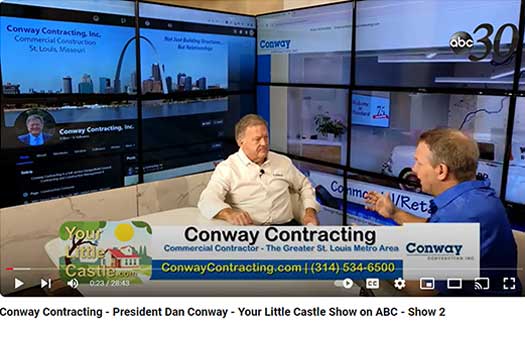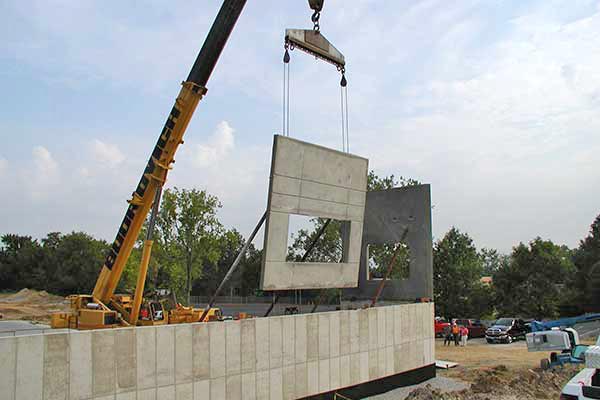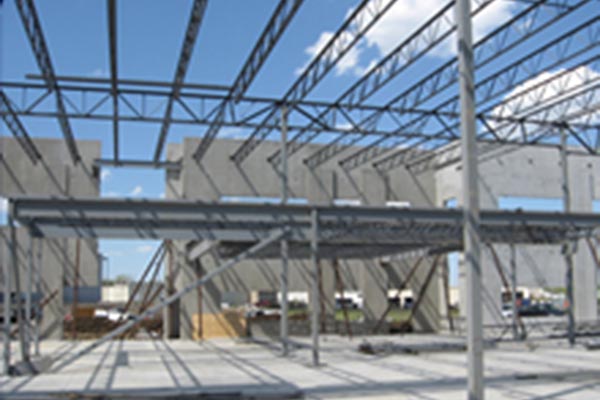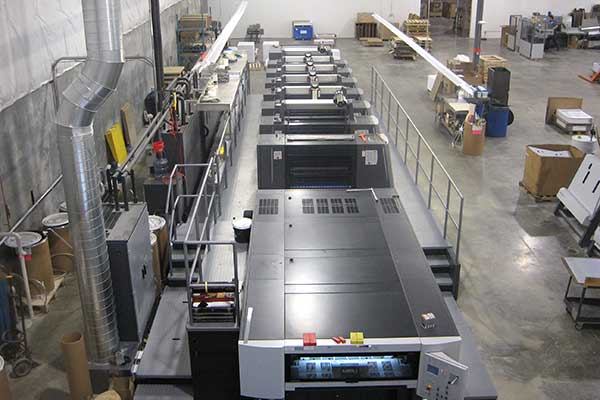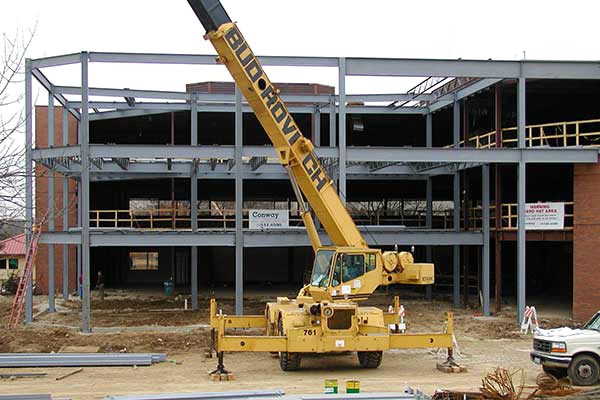Dan Conway Interviewed for ABC Television Show About Commercial Construction Industry (Part 1)
Dan Conway of Conway Contracting, Inc. was recently interviewed by Carter Rethwisch (AKA Cardinal Cowboy) for the "Your Little Castle" show, which aired on ABC-TV in St. Louis in two half hour shows. You can watch part one of the two interviews here. We have also included the text of the interview below.
We are a design-build general contractor that provides commercial construction and contracting services to the commercial, light industrial, heavy industrial, and retail marketplaces. We perform a lot of heavy maintenance work, and we also do a lot of due diligence for my clients who are looking to buy ground or looking to purchase a building.
by Dan Conway, Conway Contracting, Inc.Host: Welcome everyone to another "Your Little Castle" show today. It's exciting. There are a lot of people who are familiar with the fact that we all need a nice place to live, a residential place. But who builds the buildings for the businesses? So, welcome Dan Conway, Conway Contracting president, owner, founder. Dan, yes, welcome to the show. Thank you very much for having me. Tell me, why did you decide to become a contracting engineer?
Dan: It’s kind of a long story, but I'm the youngest of five siblings and all my siblings really are CPAs or business managers. And my dad bought this really cool house on Flora Place in the Shaw neighborhood in St. Louis city. The only problem is it was three stories with five, six bedrooms with a ballroom on the third floor and everything. The only problem was it was a little bit in disrepair. So, I spent my whole youth renovating this house and I learned how to drywall and tape by the time I was in sixth grade. Okay, which was great because when high school came around, I worked renovating houses in Soulard and everything. And then I took a year of accounting in high school, and right at the very end, I decided to totally change directions. And I did a 180, and I went all into construction, and I went down to University of Missouri S&T down in Rolla, Missouri, to become a civil engineer.
Host: Okay, yeah, an engineering background would be something that would make sense with what you do because you want to be able to construct. You've got to get the right weight leverages and angles and, absolutely, triangles and all that. It helps. It does help. All right. Well, we always are highlighting the leaders, and with that, we'll shout out to our sponsors. Um, give it up for Brook Dubman, Carol House Furniture because you like nice things in your little castle. If you didn't have a castle to put your furniture in and the reason you can have a castle these days is because you've got great mortgage companies out there to do a great job. So, our sponsor is USA Mortgage, the Flowers Team. Thanks to all of them.
Host: With that, let's go ahead and put Dan's information up here on the walls. We built some TV walls in here and lots of great information here. You got a great-looking website, Conway Contracting.com. And when it comes down to the essence of building construction, tell us a little bit about that. What was the path? You gave us a little bit of the background, but give us the in-depth. And then you took the leap after you got that engineering. What compelled you to start your own company?
Dan: Well, I always acted like an owner, even when I was not. And I've got the adage to blow people away. I've had my own company for 21 years. When I left my previous firm, all my clients thought I had owned the company. And so, I take it to heart. I feel personally responsible. One thing that we do is after we build every space or facility, we go back every six months to a year and check on how the facility is performing. And we work really hard to make sure all the details and everything is performing correctly. That really helps to build rapport and a repeat business model.
Host: As a matter of when you're talking about the types of jobs you're doing, these aren't $50,000, $100,000. These are multi-million dollar jobs many times. And so you might want to stay in contact with the people. Maybe they say “Anything you need -- extra work, something additional, maybe something you need to make a quick repair on” to make them happy because these guys put a lot of money into it. It keeps your good reputation.
Dan: No, we have our guys go by every six months to a year. And, if a lock set is loose or something, they come and we just take care of it. But we also just want to make sure that the facility is performing like it was intended.
Host: Well, that's important, because so much money's put into these. A little bit of caring feeding, they call that, a little bit to make sure that everybody's happy because, you don't keep a company running for 21 years unless you've done good work that a lot of people respect what you've done, that is correct. That is important. What's a personal hobby or passion that might have led to this for you, something that we like to help people become motivated a little bit by what they can learn from what you might have done when you were a kid?
Dan: Well, some of our hobbies, not my, I mean, my wife and I, we like to travel a lot. And we like to go to breweries and wineries and distilleries. And we're big college football nuts. We actually had a son that went to Alabama, Roll Tide. And then a daughter that went to South Carolina, go Gamecock. And then both my wife and I went to University of Missouri schools, and here and “Go Tiger”. We actually went to the K game earlier this year when Mizzou hit the 61-yard walk-off the field goal. What was so neat is we had 5,000 fans run on the field within like 60 seconds. So those are some of our hobbies that we like to do.
Host: Well, that competitive sports background. I think there's a lot that kids learn from sports. If you don't play sports, you're missing out on how to communicate, how to play on a team, how to win, how to lose, absolutely. And, uh, there's so much we gain from sports that if you’re not participating you’re missing out on alot about life. Well talk a little bit about how long have you’ve actually been in business.
Dan: I've been in the construction business for 38 years, and I've had my own construction business for 21 years.
Host: Twenty-one years with your own company – they say once you've made it to that 10-year mark, you've really made it. That's important. And now you've doubled that. So, a lot of buildings that you're familiar with – we'll talk about some of the buildings Dan has built here in St. Louis. A lot of charitable work, a lot of community stuff you do – that's really neat.
Host: Dan, what type of work do you perform?
Dan: We are a design-build general contractor that provides commercial construction and contracting services to the commercial, light industrial, heavy industrial, and retail marketplaces. We perform a lot of heavy maintenance work, and we also do a lot of due diligence for my clients who are looking to buy ground or looking to purchase a building. We do additions, alterations, tenant finish-outs, new facilities, and like I said, we do a lot of heavy maintenance work.
Host: So you've got some big construction – you'll see some of the big machines you pull in there to demolish and pull up and get the ground ready, etc., and lay some foundation and put these big structures in place. Wat's a good fit for you? Who's a good lead for your business? Somebody to say, 'I need Dan's work.'
Dan: You know, a growing business is always on the move. We do a lot of work, and we have a lot of relationships with facility managers, commercial architects, commercial real estate brokers – any business that's looking to expand or build a new facility or actually buy a facility. You know, it's kind of a scary deal – you want to do due diligence or if you're looking to buy property. We represent a lot of our clients and help them buy property.
Host: So as a matter of the whole process, somebody could come in and say, 'We need to get the land. We need to get the survey. We need to get everything from start to finish.' You could help a company put that in place, right?
Dan: Right, because a lot of times, even when you're comparing two lots, one lot may be a lot more buildable than another lot. And sometimes it's misleading with the price – you want to get a better bang for your buck.
Host: Interesting, because when you're starting to put a foundation and putting bids on these places, I guess they're talking hundreds of thousands of dollars just to get the land many times. And then you want to make sure it's a good fit because the slope is wrong or what are some of the issues people run into with the land? They say, 'Oh, we like this spot,' but you're like, 'Let me explain.'
Dan: Well, right – it's topographically challenged or something like that. Or it may have poor soils, or it may have rock or something like that. And so what looks like a good deal, and it happens all the time, is not necessarily a good deal.
Host: That's why you bring in experts. That's why we want somebody to explain to us when you're doing commercial contracting, you've got to have the experts that can help with that. These are starting at the foundation, right? Now we're just getting started, and you've got to say, 'Here's the land. You're going to put out there. How does this fit?' What is it about your business that really fuels your passion? I mean, obviously, something that you started a long time ago, you keep this going – what is it you love about what you do?
Dan: Well, solving your clients' problems, and just like probably your show here, it is so great to work with business owners and figure out how everybody earns a living. It's really cool and exciting. And to work around entrepreneurs – people that are out there trying to grow their business and everything – it provides a lot of energy and it's very energetic and uplifting to be in that industry./p>
Host: I can imagine a lot of people, everybody wants to build. The kids say, 'I would love to build big buildings in town. Who can build the biggest building in town?' You're somebody who's actually followed your dream and has gone out and done that.
Dan: We've built a number of buildings, maybe not the biggest building, but we have built quite a few buildings.
Host: Tell us – what types of buildings do you normally focus on? Is it commercial with regard to glass or – we'll show some pictures.
Dan: It’s a good mix. We've done warehouse buildings, distribution buildings. We’ve done a lot of heavy industrial, like if you buy ice in the city of St. Louis, we built the Home City Ice Plant. We've done batch plants for Better Life, producing their cleaning items. I did the Mark Twain Mall as a construction manager – one of the buildings out in the mall. Anywhere from retail to parking garages – very complicated. I've even done fraternity houses, of all the crazy things.
Host: Well, everybody needs a nice fraternity house. You've got to build a little extra structure in there because those guys are a little rough on it.
Dan: And we put plywood behind all the walls first before we drywalled them. (They both laugh)
Host: That's interesting – plywood behind the walls because they might just knock that down a little bit.
Dan: A little liquid courage and you never know what's going to happen.
Host: That's interesting. Well, good structure and a lot of confidence that gets built into those systems. As a matter of longevity, you've got a lot of great reviews. We're going to put them up on the wall here – some of your businesses that have paid attention to you guys and really like the work that you've done. So, I'm going to review that a little bit with everybody over here on the wall to our right. I'll put that up for everybody to see if you can see it. It's on the wall over that side over there. Okay, (reading) Brad Hornberg, civil engineer, he says, 'I hired Dan of Conway Contracting when my fraternity at Missouri S&T in Rolla was contemplating a new chapter house. Dan and I worked together with planning, design. He handled the contracts, obtained the permits, sources, and hired contractors where needed. And when I suggested a new house construction would take two years, Dan said, 'Let's do it in one year.' So, you made this. See, I found Dan to be communicative, always willing to listen, and he stood by his work and followed through. Brad Hornburg, civil engineer. So, go back to the place where you know some people – you got some connection there, and you want to – you got to make these guys – were you part of that fraternity?
Dan: Not that fraternity, but I ended up – it was the craziest thing - I built four fraternity houses down in Rolla. Now, that's the college that I went to. I started with my fraternity house first. And then when you do good work, the word gets out. That's actually my fraternity house there (refers to image), the white one.
Host: We’ve got some of Dan's work up here on the screen flashing by on us. Here's some more industrial-commercial. There's some downtown area for the arch. But your focus is in St. Louis and obviously a lot of work that you've done here.
Dan: Within 200 miles of St. Louis.
Host: So you'll extend a little bit out of the metro area.
Dan: We've done work in Kansas City, quite a bit of work down in Rolla, over in Illinois, and the Collinsville area.
Host: Okay, we’ve got another nice review here. Let's give everybody a glimpse here. (reading) As the owner of ABBCO Service Corporation, I utilized Conway Contracting for the renovation and build out of our newly purchased 12,000 square foot corporate headquarters and warehouse in St. Louis, Missouri. Dan and I worked together planning, designing. All the employees were very happy. Dan's team were always available. John Pieske, president and CEO of ABBCO. I've seen the sign on the highway. You can see them on Highway 70. Is that the building?
Dan: No, that's a different one. These guys are down in South County and Green Park.
Host: Well, a 12,000-foot building, obviously, there was a lot of work put into that. And this is what you do. All right, with that, we'd like to talk about what is it that really sets you apart. Tell me, if there's something you could say over the years of your work, putting together a successful business, give me a couple of tips as something that really sets you apart.
Dan: In commercial construction, it really is all about the details. You really want to get the details right and review a set of drawings for its buildability. And if the details are details that are going to perform in the long term. So, we really look at that. We're very proactive. Another thing we do is we do training every single month with our staff. You know, we review things from earthwork, pouring concrete, to setting steel, doing HVAC systems, electrical systems, fire protection. We want to make sure that we're knowledgeable, leading edge, and we're doing the details correctly.
Host: Tell me, what is the difference? A lot of people are familiar with the residential side of construction. How does commercial construction differ from what you see when you're doing residential?
Dan: It's really the quality control. To give you an idea, in the whole residential business, you’ve got all the foundation repair businesses and everything. Well, we can never be in a point that we’ve got to repair a foundation. The quality control of doing earthwork and compaction, is not as existent in residential as it is in commercial. So, everything is belt and suspenders when we're doing earthwork, pouring concrete, doing a structure. You don't about hear about foundation repair companies over in (typically) the commercial building sector. So, it's a lot more stringent.
Host: Is that because there's so much more at stake for them? There's a matter of – we've got a big business that depends on this. A house can potentially – not to say they’re any less important, but if they're out of the house for a couple of weeks, a couple or a months, a business can't afford to be shut down for that long. There's just more, right?
Dan: I tell you, in residential construction, these guys are geniuses to be able to build a house for that price point. They've got to get it done quickly. They do an incredible job and everything, but there's a certain price point there. In commercial construction, you can't afford, like you said, downtime or anything like that. It's just a different level of construction. And, it's a different price point. You can't ever be down. You can't afford to ever come back to a project.
Host: Is that where the term commercial grade comes from?
Dan: Yes, commercial or industrial grade. Or institutional grade.
Host: What does that really mean?
Dan: It’s just like door hardware or something like that. Residential grade is what we would consider kind of like a lower grade. Residential door hardware may only get used three or so times a day to go into a bedroom where you have, like, a school facility or something like that, institutional grade. Somebody may be using that door handle 200 times a day, so the stuff has to last and perform. It's just being used a lot more.
Host: The closest thing I have any connection with there, I was looking at lawnmowers; similar concept. They said, ‘if you're buying this to be a lawn company, the warranty is no good.’ Right? You've got to get a commercial tractor.
Dan: Right, if you're cutting grass probably with it 8 hours a day, versus you're cutting your lawn once a week for an hour or two.
Host: Similar concept with what you've got going on here. Tell me then, is there more to it than does the plumbing have to be different? Is the ceiling different?
Dan: Well, in both actually knowing the details in residential construction and commercial construction. Actually doing some residential construction, because we've done fraternity house and institutional, they have a lot of very tricky details, and residential construction is very personable too. So you've got a lot more contact with people. It's just that, it's a lot more expensive (in commercial). You may have overhead cranes or something in a facility. You”ve got batch plants, a lot of really expensive equipment. You’ve got floor tolerances if you're putting printing presses in a facility or something like that; it's just a lot higher tolerance level.
Host: Is there more to it that would add cost, especially when we start building up? Because most of your residential, it's rare you get a house that's over two stories, maybe a three-story house. Once you get into those fourth, fifth higher levels, does that add to some of the construction?
Dan: It does. We've really only built buildings up to about five stories or so, but, it's all about the cost of the ground. If you've got very expensive ground, the best use of that piece of ground is you're going to have to start going up with it. So you'll see a lot of people, as the ground is more and more expensive or the density is there, people start putting parking garages in and start going vertical. And that project will pay for itself if it’s that expensive a piece of ground.
Host: You see some of that. Have you seen some of the new facilities where they've got commercial and then they've got residential; they're almost apartments now, like Fifth Street in St. Charles they're building?
Dan: It's great. That whole area has become a place where you can work, live, and play. That's kind of the new concept in a lot of downtowns and everything. And you're seeing that script being replayed all the time. A great use of space, where the whole internet, everything that you can do now, you can do work remote, and/or you can work nearby. A lot of young people like a lot of the bars and restaurants and things like that nearby. Great concept, great example.
Host: It seems like we've just become more creative with having all the resources in one place. You've got the shopping market around the corner; you got a little Quick Mart./p>
Dan: You're seeing a lot of that in downtown St. Louis right now; a lot of the buildings, trying to build a residential population and then start with retail, maybe with a little bit of office, and then a residential component in it and kind of get a real good mixed-use going. And midtown, it's just taken off in St. Louis city.
Host: Do you help get, or are you part of it, many times helping these companies or these cities revitalize a little bit? As the cities get older, they'll tear down a building and put something new there.
Dan: I grew up and was raised in St. Louis city. I live out in Kirkwood, but my business is in St. Louis city by, Jefferson and Highway 40. I've recently bought a building in that area, and we're committed. It's the hub for the whole area, and all the excitement that's going on in in Midtown right now with St. Louis SCC. You've got the Foundry now; you've got the Armory. They just opened up a new Top Golf right there. I mean, there's a lot of excitement that's going on in Midtown right now.
Host: Well, that's the key, having the right commercial presence there, people that are building the buildings in the right fashion for longevity too.
Dan: It’s that whole recipe of a mixed-use of retail, office, and residential. They're converting a lot of the buildings downtown and building some new, great-looking facilities right now nearby.
Host: Yeah, well, it's a thriving city. St. Louis is a city that’s 200 plus years old, and they kind of revitalize; they'll come back and reconstruct a lot of things. How often do you have to tear down another facility and say, hey, that built place was nice, but you talked about how the land is so important to have the right place to put a building; so you tear down something and put something new on top of it.
Dan: Well, all the great sites are gone. Probably everything like east of Jefferson's probably been built on three times; everything probably east of Grand has been built on twice. A lot of things are still on their first generation, but you see it now as the patchwork quilt has filled in for the central part of St. Louis, which I think is very exciting is all these new facilities are going in. I think slowly there's just been a nice buzz going on in St. Louis. The word hasn't completely gotten out, but you know if you'd see the crowds that are coming down to the Armory and the Foundry and everything, you'd be blown away.
Host: Yeah, I do; I've visited those places a few times. There is so much excitement; it seems like, uh, the Armory, back in the day I played football inside of there; they played softball, softball, and now they've kind of essentially gutted that and poured it out, and it's a huge facility.
Dan: It's a great facility. I think I've been there when it first was opening up; I mean, there may have been 3 or 4 thousand people in that place. It's a big facility.
Host: And again, it takes the commercial-grade professional builders. Your industry is obviously very competitive. What do you think has really kind of allowed you to have so much success here in St. Louis?
Dan: It's kind of a mixed bag. Besides, like I said, the training, working on details, making sure buildings perform, we do a lot of work open book. I'd say probably 25% of our work is open book.
Host: What does open book mean?
Dan: Construction can be scary and intimidating. People want to make sure they got a great deal, a fair shake, and a team approach. So we'll work out, like a percentage fee basis to start with, some general conditions. Then, what services do they need? Do they already have an architect or civil engineer? If not, I can provide all of those services. We can agree on a scope of work, and three or four bidders; they may have a couple of favorite bidders. We put it al together, and we'll get three or four bids in every category. And we put kind of a presentation book together, and we all sit together and review the scope, review the bids. They're part of the team; it's a complete team that does it; they really feel like they're part of it. Then we roll it up into a lump sum contract and get going. It's a great comfort level for an industry that's, like I said, a little intimidating and can be a little scary.
Host: Yeah, I can imagine there's a lot that goes into this. How often do you have to play nice with the other people that are going to have to contribute, and you’ve got to bring in contractors that specialize in certain components and build certain things. That's where you have to kind of be the overseer.
Dan: Yeah, we’ve got to play referee, if you want to put it nicely. I think we've got a great family name in St. Louis. We're straight shooters. And that's why I put my family name on my business. You know, my previous owner, he intentionally didn't put his family name on it. Casey said, ‘in case I ever have to walk’. I was like, well, ‘I'm putting my name on it.’ Because we stand behind the work that we do.
Host: That's where we say if you're doing stuff to help support our community here in St. Louis, that's where we put the cowboy hat on because that's what that represents. So often people get lost in the shuffle. They're not focused on making a difference; they they get kind of self-consumed. It’s a matter of just doing what's right. Stick with the product, provide that high quality, quality over quantity. You're not building 1700 square buildings; you're focusing on a structure at a time and doing a great job with that.
Dan: Well, I have to go to bed at night and be able to sleep at night. We have to be belt and suspenders; we've got to have the quality control. We’ve got to do it the right way, because after you've been doing it for 38 years or so, you can't have issues lingering around; you’ve got to do it the right way. And you know what, not everything does turn out perfectly. The way you can show your salt, your worth, is that you come back and took care of that issue. It is so important, and actually that endears you to clients even more so, and earns you the repeat work.
Host: Very important. We talk about it from time to time on the show, but you bring up the fact that there is almost always going to be some kind of an issue. something you have to juggle, something you have to take care of. My dad made the quote we used, ‘life is how you overcome the hurdles of life. The error is not why you lose the game; it's how you respond to that error.’ You come back through and said, ‘we'll make this right; we'll fix it.’ Miscommunication, misunderstanding; ‘absolutely, we're going to get it right.’
Dan: Okay, everybody. Well, we've got a nice half-hour discussion here. We’ve got another half-hour to talk with Dan, and we're going to go over some more in-depth stuff like ‘what is the biggest mistake made in the commercial space’ because there's a lot that can go wrong. And you want to make sure that doesn't happen to your company when you're building such a space. So stay tuned as we do our second show here coming here on the "Your Little Castle" show on ABC here in St. Louis.
br>
(Click here to view part two.)

